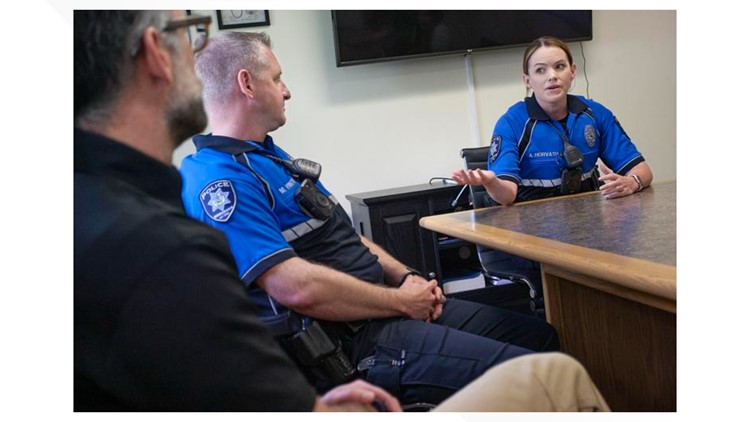MERIDIAN, Idaho —
This story originally appeared in the Idaho Press.
The Meridian Police Department has filled out its Crisis Intervention Team this year, and it has drastically improved de-escalation tactics, the team says.
The CIT at Meridian PD is made up of three members — Michael Panter, Ashley Horvath and Sam Luque. Luque started in March as a mental health coordinator, becoming the third and final member of the team.
All officers are CIT trained, MPD spokesperson Kelsey Johnston said, but this team has additional training and methods it uses, and has attended additional classes to learn more about psychology and mental health responses.
Crisis calls can range from an individual needing to talk to someone because they are depressed, to a suicidal individual threatening to harm themselves. Each comes with its own evaluation and assessment, Luque said, and no case is the same. Nearly all of it is de-escalation, he said.
Luque said changing the stigma around mental health should be a priority. People tend to think if someone is mentally ill, that they are dangerous.
“I think that's something we're constantly trying to do, is to challenge that stigma,” Luque said.
It’s just like any other illness, he said — to get help, it must be brought to light. De-escalating a person in a crisis situation and trying to understand their emotions is the first step.
“We don’t look for a crime. We look at how we can help the individual,” Luque said. “The first thing to do is to de-escalate the individual. They're having a hard time dealing with the situation due to heightened emotion, so when we can de-escalate that individual we can then work on getting them the proper resources that they need.”
Luque will arrive in plain clothing, Panter said, and he and Horvath may arrive in lighter blue uniforms — unusual for typical police uniforms — so people, especially juveniles, feel more comfortable.
“Yesterday, we went to a call where an individual was in crisis. And when we first got there they had a very hard time articulating their thoughts and emotions because they were just that overwhelmed with what was going on internally,” Horvath said. “A big part of that was taking the time to have a normal conversation with them. We're not yelling and screaming directives. We walk in and try getting down to their level and try to get to know them, to know what's going on,” she said.
Panter said 85% of the job is just verbal — talking and getting to know the person is what the team spends a lot of time on.
He believes that with the growing population, calls have been getting more frequent. And, the people who work in traumatic jobs tend to seek help the least.
“Police, nurses, mental health professionals, they can need help, too,” Panter said.
Horvath said the team responds to elderly people with Alzheimer’s, those with developmental disabilities, juvenile incidents, depressed and anxious individuals, people with substance abuse challenges, some who may be hallucinating, psychotic breaks, and more.
The team also arrives in unmarked cars to make the person in crisis more comfortable, as well as concealing that police are at the residence. Panter and Luque said it also helps with de-escalation as well. The feeling of being put into a marked police vehicle can put people more on edge.
“We don't want people feeling like they’re getting in the back of a police vehicle and going to jail,” Horvath said. “And it really just protects their privacy.”
They always follow up after they get the person the help they need, Horvath and Panter said.
“A lot of people sometimes have one bad day, and they say ‘hey, I was just having a bad day.’ Sometimes they say they wasted your time – no, they never waste our time. First time they’re here to get any help. Other ones say they didn't know where to start,” Panter said. “When we follow up with them a couple weeks later, they say it’s what they needed.”
If the team is sent to a difficult call, Horvath said, the team will debrief it. And, the team gets ice cream, Panter said.
“It's not easy to respond to those calls every single day,” Horvath said. “You know, I think all three of us who sit at this table have reasons why we're passionate about what we do.”
This story originally appeared in the Idaho Press. Read more at IdahoPress.com
Watch more Local News:
See the latest news from around the Treasure Valley and the Gem State in our YouTube playlist:



